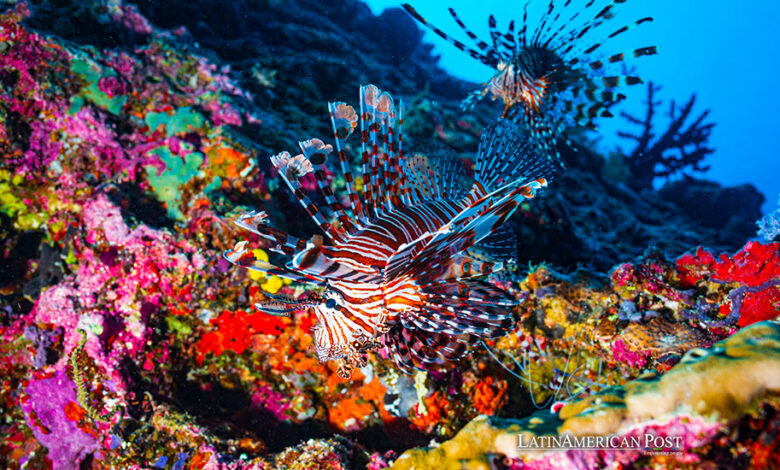Brazil Launches Program for ‘Blue Economy’ Through Reef Preservation

Brazil launches a pioneering program in Rio de Janeiro to restore and protect its coastal coral reefs, aiming to harness the ‘blue economy’ for sustainable development and create economic opportunities through marine conservation.
In a significant stride towards environmental and economic sustainability, the Brazilian government, from the vibrant city of Rio de Janeiro, has unveiled a groundbreaking initiative to rejuvenate and safeguard the nation’s coral reefs. This ambitious program is set to catalyze the burgeoning ‘blue economy,’ generating revenue and jobs by preserving marine environments. Spearheading this initiative is the Brazilian Development Bank (BNDES), a key financial institution in the country, committing up to 60 million reais (around $12 million) to fund non-profit organizations dedicated to coral conservation efforts.
Protecting Vital Marine Ecosystems
The funding will focus on shallow-water coral reefs, the most popular with tourists, and the country’s two extensive coral banks. These ecosystems are vital for oceanic biodiversity but are increasingly threatened by climate-induced phenomena such as rising sea temperatures.
BNDES’s initiative aims to stabilize marine ecosystems, yielding beneficial outcomes for tourism and fisheries along Brazil’s coastal regions. To qualify for support, projects must address critical areas such as improving water quality in reef-feeding basins, combating destructive fishing practices by fostering alternative livelihoods, and planning community-based tourism initiatives linked to coral ecosystems.
Projects in locations with high reef concentration and density will be given priority, particularly in the country’s northeast, which boasts a significant portion of Brazil’s 8,500-kilometer coastline renowned for its coral diversity.
Investment and Economic Impact
The total investment could reach $12 million, with BNDES providing half the remainder sourced from project partners. Each project must secure a minimum of 5 million reais (about $1 million), with cost-sharing equally divided between BNDES and the project proposers.
The research highlighted by BNDES reveals the economic and environmental value of reef conservation: each square kilometer of the preserved reef can save approximately 940 million reais ($188 million) in coastal protection expenditures and generate 62 million reais ($12.4 million) from tourism. This translates into a potential 7 billion reais ($1.4 billion) boost from coral tourism for Brazil. Such promising figures not only underscore the economic potential of the ‘blue economy’ but also make the audience feel optimistic about its future.
Globally, coral reefs are estimated to support 30 million jobs, underlining their importance for biodiversity, economic stability, and growth.
The Brazilian initiative, a beacon of hope for coral reef preservation, is not just a local effort but a part of a larger movement across Latin America. Nations like Mexico, Belize, and Colombia, with their rich marine biodiversity, are also stepping up to protect their coral reefs, recognizing their importance for both environmental sustainability and economic development. This collective action underscores the shared commitment of Latin American countries to marine conservation, making the audience feel informed and connected to the regional efforts.
In Mexico, the Mesoamerican Reef, the world’s second-largest barrier reef, has seen concerted conservation efforts focusing on sustainable tourism and fisheries management. For example, the government has implemented strict regulations on fishing practices and established marine protected areas. Belize, home to a portion of this reef, has implemented similar protections, recognizing the economic and environmental stakes tied to its health. Similarly, Colombia’s efforts to conserve its coral reefs, particularly around the islands of San Andrés and Providencia, include the establishment of marine parks and the promotion of sustainable tourism. These initiatives highlight a growing regional commitment to marine conservation and provide a valuable comparison to Brazil’s program.
These initiatives across Latin America not only contribute to preserving marine biodiversity but also offer a blueprint for sustainable economic development. They leverage the blue economy to create jobs, protect coastlines, and ensure the long-term health of marine ecosystems.
A Global Endeavor
The program launched by Brazil, therefore, is not an isolated endeavor but part of a broader regional and global narrative. It signifies a collective acknowledgment of coral reefs’ critical role in sustaining marine life, supporting economies, and mitigating the impacts of climate change. By investing in the health of these underwater treasures, Brazil and its Latin American counterparts are safeguarding their environmental heritage and charting a course toward a more sustainable and economically vibrant future.
Also read: Brazil Tackles Credit Card Debt with New Interest Rate Caps
Brazil’s proactive stance in coral reef conservation through the BNDES-funded initiative is a laudable step towards realizing the potential of the blue economy. However, it’s important to note that the success of the program will depend on various factors, including the effectiveness of the conservation efforts and the ability to balance economic development with environmental protection. As this program unfolds, it will inspire a concerted regional effort towards marine conservation, contributing to the global endeavor to protect our planet’s vital marine ecosystems and the myriad of life they support.





